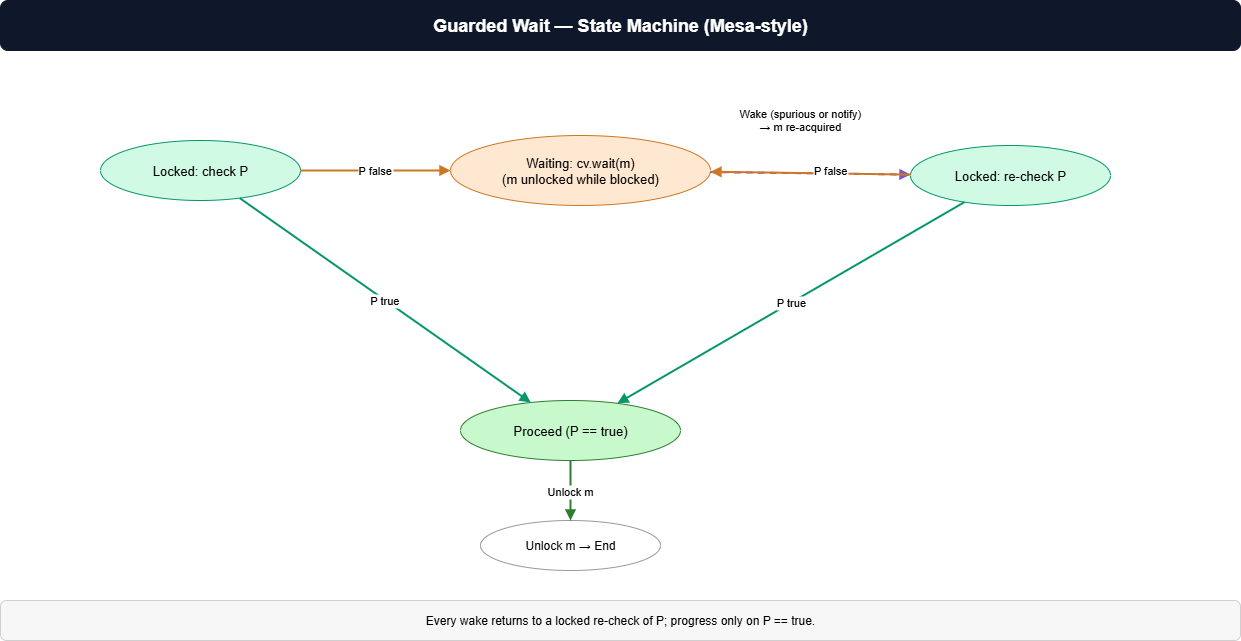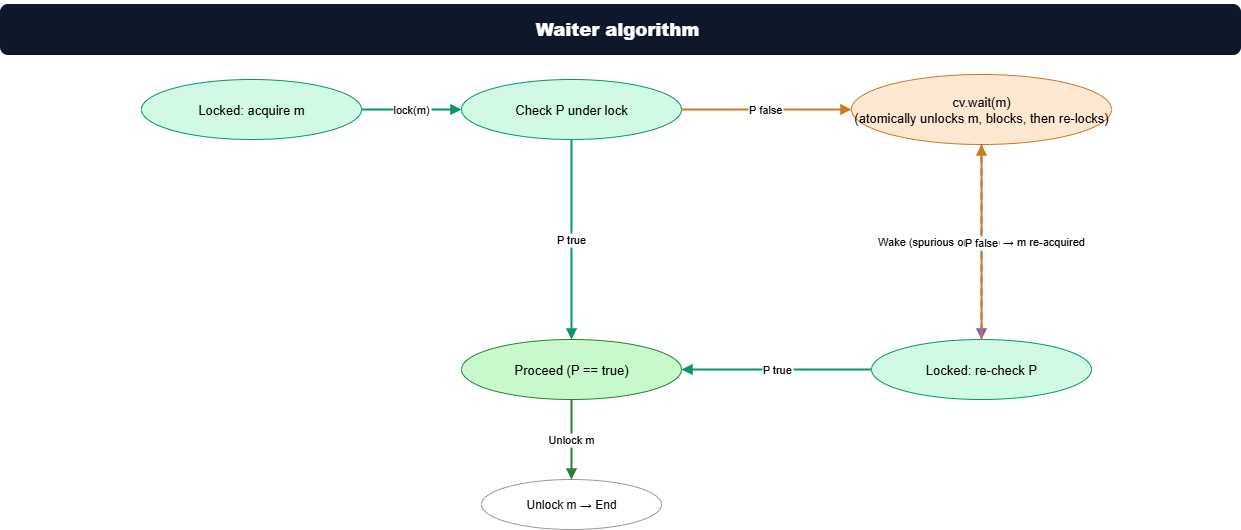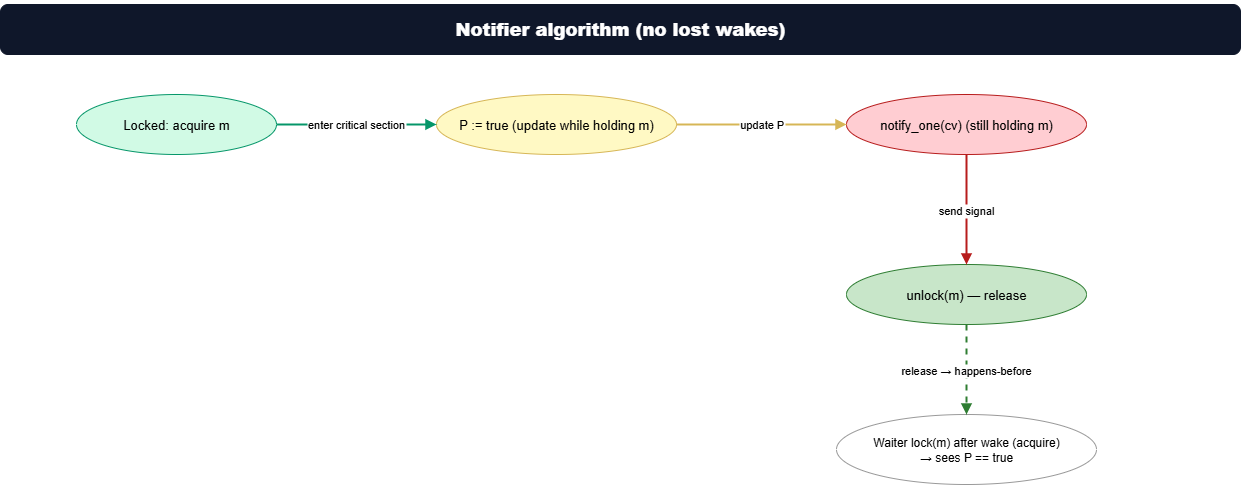Why Spurious Wakes Are Just Hints: Handling Condition Variables Safely

Introduction
Threads sometimes wake even when nothing changed. That’s a spurious wakeup: the wait returned, but the condition you care about isn’t satisfied. Robust systems treat a wake as a hint and re-check the shared state under the same lock before proceeding.
1. What a Spurious Wakeup Is ?
A waiting thread can resume without a corresponding signal that made its predicate true. This is allowed by many primitives (POSIX condition variables, C++ condition_variable, Windows CVs) and may also arise from races, broadcasts, or internal scheduler behaviors. If code assumes “wake means ready,” it will occasionally run on invalid state.
__Why Systems Allow It ?__
Allowing extra wakes simplifies kernel and runtime implementations and avoids edge cases like lost signals. It also enables performance optimizations such as batching, coalescing, or defensive unblocking. The contract shifts responsibility to user code to verify readiness after any wake.
2. The Correct Waiting Pattern
- __Model (Mesa semantics) :__
On POSIX and in C++, condition variables are Mesa-style: notify only makes a waiter runnable; it neither hands over the mutex nor promises that the predicate is true when the wait returns. That means a wake can be spurious, or another thread may grab the resource first. Correctness lives in a shared predicate P protected by the same mutex m all reads and writes of P happen while m is held.

- __Waiter algorithm :__
A correct waiter establishes the invariant “P is only observed/modified while holding m.” Concretely: lock m, read P; if P is false, call cv.wait(m) which atomically unlocks m, blocks, then re-acquires m before returning and re-check P. Only when P is true do we proceed; otherwise we stay in the loop. The loop converts spurious wakes and racing notifies into harmless retries under the lock.

- __Notifier algorithm :__
The producer side must make P true before notifying, and it should notify while still holding m, then unlock. This ordering update P → notify → unlock(m) ensures the waiter’s subsequent lock(m) observes the update: the producer’s unlock acts as a release, the waiter’s lock as an acquire, creating the happens-before edge.

3. Preventing Spurious Wakeups with pthreads
Wake ≠ ready. With POSIX condition variables, a wake is only a nudge; the predicate under the same mutex is the truth. The pattern is simple and boring on purpose: lock → check → wait → re-check → proceed only when the predicate holds.
__A tiny, single-slot mailbox (drop-in) :__
#include <pthread.h>
#include <stdbool.h>
typedef struct {
pthread_mutex_t m;
pthread_cond_t cv;
bool ready; // predicate: payload is valid
bool closed; // optional: shutdown signal
int payload;
} mailbox_t;
void mb_init(mailbox_t *mb) {
pthread_mutex_init(&mb->m, NULL);
pthread_cond_init(&mb->cv, NULL);
mb->ready = false;
mb->closed = false;
}
// Producer — set → signal → unlock
void mb_put(mailbox_t *mb, int v) {
pthread_mutex_lock(&mb->m);
mb->payload = v;
mb->ready = true; // 1) make predicate true
pthread_cond_signal(&mb->cv); // 2) wake a waiter (may wake others too)
pthread_mutex_unlock(&mb->m); // 3) publish via unlock (release)
}
// Consumer — loop on the predicate
// Returns 0 on success, -1 if closed with no data.
int mb_get(mailbox_t *mb, int *out)
{
pthread_mutex_lock(&mb->m);
while (!mb->ready && !mb->closed)
{
pthread_cond_wait(&mb->cv, &mb->m); // unlocks; blocks; re-locks before return
}
if (!mb->ready && mb->closed)
{
pthread_mutex_unlock(&mb->m); return -1;
}
*out = mb->payload;
mb->ready = false; // consume
pthread_mutex_unlock(&mb->m);
return 0;
}
void mb_close(mailbox_t *mb) {
pthread_mutex_lock(&mb->m);
mb->closed = true;
pthread_cond_broadcast(&mb->cv); // wake everyone to observe 'closed'
pthread_mutex_unlock(&mb->m);
}
Why this resists spurious wakes. The consumer always re-checks ready (and closed) under the mutex after any return from wait. The producer sets ready before signaling and only then unlocks; that unlock is the release that makes the write visible to the consumer’s next lock (acquire). If a thread wakes spuriously, the loop just runs again.
__Timed wait? Same contract :__
#include <time.h>
int mb_get_until(mailbox_t *mb, int *out, const struct timespec *abs_deadline) {
pthread_mutex_lock(&mb->m);
while (!mb->ready && !mb->closed) {
(void)pthread_cond_timedwait(&mb->cv, &mb->m, abs_deadline);
// timeout is just another wake — loop re-checks
}
if (!mb->ready && mb->closed) { pthread_mutex_unlock(&mb->m); return -1; }
*out = mb->payload; mb->ready = false;
pthread_mutex_unlock(&mb->m);
return 0;
}Multi-waiters? Still fine. signal or broadcast may wake several threads; each re-checks the predicate and only the one that finds it true proceeds. No special casing needed.
__One pitfall to avoid (don’t do this)__
pthread_mutex_lock(&m);
pthread_cond_signal(&cv); // notifying before setting the predicate
P = true; // makes a lost-wake window
pthread_mutex_unlock(&m);If a waiter wakes here, it can read P == false and go back to sleep forever. The fix is exactly what the mailbox does: set → signal → unlock.
Conclusion
Spurious wakeups aren’t a bug to stamp out they’re a contract to respect. Treat every wake as a hint, and let the predicate decide under the same lock. On the producer side, keep the order strict—set → notify → unlock so the waiter sees real state, not wishes.